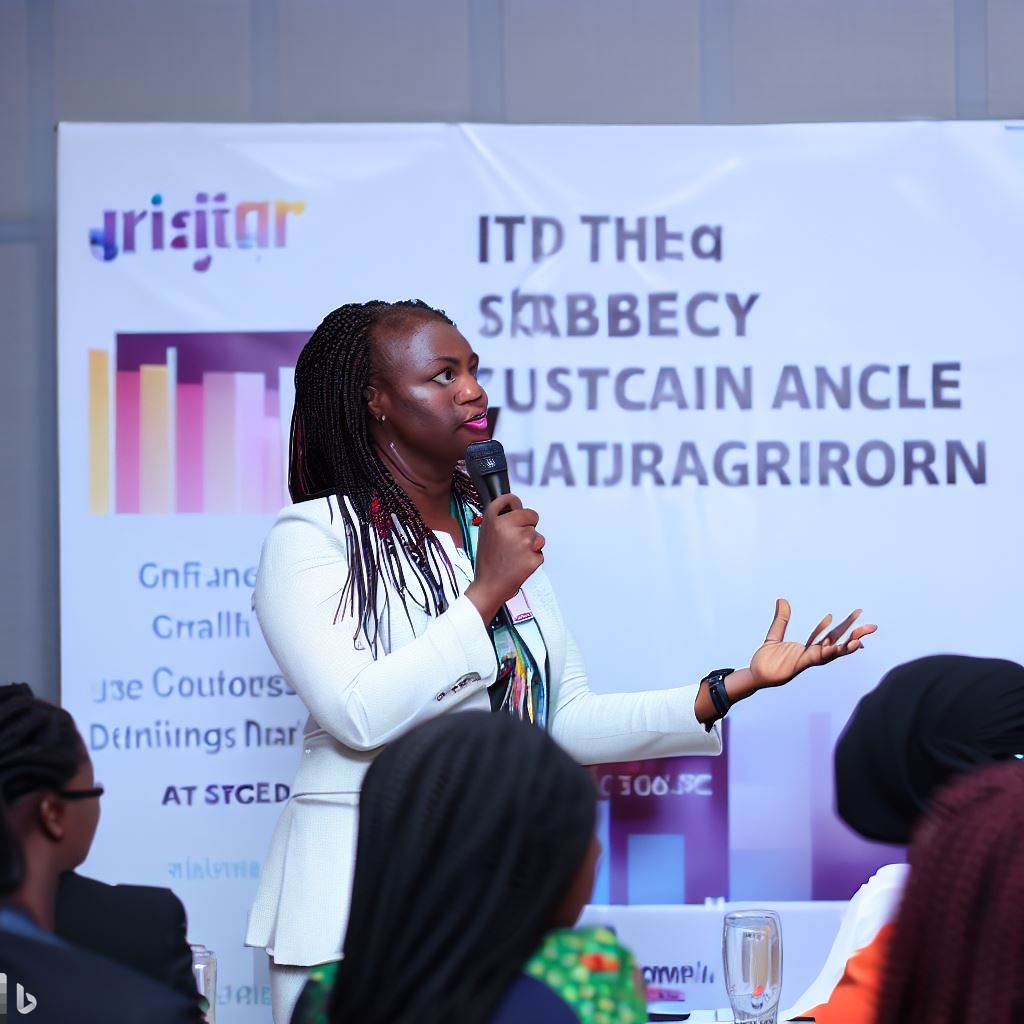Introduction
The Gender Gap in the Nigeria IT Sector highlights a pressing concern that calls for immediate attention.
The IT sector in Nigeria has witnessed significant growth in recent years. With the rise of technology, it has become a crucial contributor to the country’s economy.
Gender diversity in this sector is of utmost importance to ensure inclusive growth and development.
Importance of Gender Diversity in the IT Sector
Gender diversity plays a vital role in promoting innovation and creativity within the IT sector.
It brings a diverse range of perspectives, ideas, and skills to the table, contributing to the overall success of organizations.
Additionally, it fosters a more inclusive and equal work environment, essential for sustainable growth.
This blog post explores the current gender gap in Nigeria’s IT sector and highlights the need for bridging this gap.
Nigeria’s IT sector has been predominantly male-dominated, with significantly fewer women occupying leadership roles.
The underrepresentation of women in this crucial industry is a pressing concern that needs immediate attention.
This gender gap in the IT sector is mainly a result of deep-seated social and cultural norms. Traditional gender roles and bias often discourage women from pursuing careers in technology.
Lack of access to education, training, and mentorship opportunities further perpetuate this divide.
Bridging the gender gap in Nigeria’s IT sector is crucial for several reasons. Firstly, it helps address the scarcity of skilled professionals in the industry.
By tapping into a wider pool of talent, organizations can meet their needs and stay competitive in today’s rapidly evolving tech landscape.
Furthermore, promoting gender diversity in the IT sector empowers women economically and socially.
It provides them with opportunities for career advancement, leadership roles, and financial independence. This, in turn, has a positive impact on their families, communities, and the overall economy.
To sum it up, the gender gap in Nigeria’s IT sector is a pressing issue that deserves attention.
By promoting gender diversity, organizations can harness the potential of a more inclusive workforce, leading to innovation, growth, and a more equitable society.
It is essential to bridge this gap and create an enabling environment for women to thrive in the IT sector.
The Gender Gap in Nigeria’s IT Sector
Statistics and Insights into Gender Representation in the IT Sector
The Gender Gap in Nigeria’s IT sector is a concern that necessitates urgent attention.
Key statistical revelations highlight this disparity:
- Merely 30% of Nigeria’s IT workforce comprises women.
- Over the past decade, female representation in the IT sector has stagnated.
- Managerial roles in IT are predominantly occupied by men, with a mere 15% representation by women.
- The gender gap is pronounced in technical roles, with women constituting just 20% of the workforce.
- These statistics underscore the significant gender imbalance pervasive within Nigeria’s IT landscape.
Factors Underpinning the Gender Gap
Societal Norms and Cultural Biases
Entrenched social expectations often funnel women into traditionally feminine career paths, dissuading them from pursuing IT careers.
Limited Access to Education and Training
Educational and technical training obstacles disproportionately impede Nigerian girls, limiting their prospects in IT.
Gender Bias and Workplace Discrimination
The IT industry frequently subjects women to bias and discrimination, curtailing advancement and discouraging entry.
Addressing this gender gap requires a multifaceted strategy. It involves:
- Challenging Stereotypes: Redefining societal norms and dispelling cultural stereotypes can encourage women to embrace IT careers.
- Enhancing Educational Opportunities: Equitable access to education and technical training should be ensured, empowering girls to excel in the field.
- Countering Workplace Bias: Creating inclusive workplaces that proactively promote gender equality fosters an environment where women can flourish.
In fact, resolving the gender gap in Nigeria’s IT Sector demands a concerted effort.
This encompasses debunking stereotypes, equalizing educational access, and combating workplace bias.
Such actions pave the way for a more diverse, inclusive, and innovative IT sector that benefits both women and the industry at large.
The Benefits of Gender Diversity in the IT Sector
The Gender Gap in the Nigeria IT Sector highlights a pressing concern that calls for immediate attention.
Addressing this disparity is not only a matter of equity but also holds the potential to unlock a host of benefits for the industry and the organizations within it.
Delving into these advantages underscores the significance of fostering gender diversity:
Fostering Innovation and Creativity
Gender diversity injects a mosaic of viewpoints and concepts into the IT sector, acting as a catalyst for innovation.
Encouraging a mix of perspectives enables organizations to harness the imaginative capacities of both men and women, propelling innovation to new horizons.
Diverse teams, enriched by distinct skills and backgrounds, approach problem-solving with fresh angles, thus amplifying their capacity to discover inventive solutions.
Amplifying Problem-Solving Prowess
Incorporating gender-diverse teams equips companies with a versatile toolkit for tackling intricate challenges.
Such teams draw upon a spectrum of problem-solving approaches, equipping them to navigate complexities with finesse.
The diverse nature of these teams engenders consideration of a wider array of potential solutions, culminating in informed decision-making and effective issue resolution.
Engagement of diverse thinkers cultivates a space for exploring alternatives, eradicating the trap of groupthink.
Elevating Company Performance and Financial Growth
Extensive research consistently underscores the favorable connection between gender diversity and IT sector performance.
Companies that embrace gender diversity tend to outshine their counterparts, yielding superior financial returns.
A diversified workforce augments talent acquisition and retention, thereby elevating the overall corporate performance.
Enrichment through Varied Perspectives and Experiences
Gender diversity enriches the IT sector by infusing an assortment of experiences, backgrounds, and viewpoints.
This plethora of perspectives contributes to judicious decision-making and an enhanced comprehension of customer requirements.
Organizations stand to gain from the synergy of diverse outlooks, which facilitate holistic problem identification and strategic mapping.
In summation, the Gender Gap in the Nigeria IT Sector serves as a compelling impetus for change.
By bridging this divide, the industry stands to reap multifaceted rewards: heightened innovation, refined problem-solving acumen, elevated company performance, and a kaleidoscope of perspectives.
The embrace of gender diversity promises a transformative journey that not only enlivens the sector but also propels it towards unprecedented success.
Read: The Impact of IT Specialists on Nigeria’s Future Development

Initiatives and Programs Promoting Gender Diversity
Government policies and programs
- Gender Quotas for Equitable Representation: The IT sector in Nigeria has witnessed a transformative shift with the introduction of gender quotas, ensuring parity in representation.
This step towards inclusivity is recalibrating industry dynamics. - Empowering Education with Specialized Programs: Empowering women in IT through tailored training and scholarships has become a cornerstone of government policy.
These initiatives cultivate a vibrant ecosystem of skilled female professionals. - Fueling Innovation with Female Entrepreneurship: Government-backed funding initiatives have become instrumental in nurturing female entrepreneurs and startups within the tech realm, igniting a wave of inventive contributions.
- Raising Awareness for Collective Progress: Public perception is evolving through insightful awareness campaigns, imparting a deeper understanding of the significance of gender diversity, thereby fortifying societal progress.
Private sector initiatives and organizations
- Unity in Diversity through Employee Resource Groups: The private sector is proactively steering change by forming employee resource groups that champion gender diversity and inclusivity, fostering an environment of collective growth.
- Fair Hiring via Gender-Blind Recruitment: Bias-free recruitment processes adopted by progressive entities are recalibrating the industry landscape, ensuring equitable opportunities for all, independent of gender.
- Guiding Lights through Mentorship: Mentorship programs, seamlessly pairing accomplished female IT leaders with aspiring junior women, are nurturing a legacy of leadership, knowledge sharing, and inspiration.
- Collaborative Empowerment through NGOs: Strategic collaboration with non-profits is channeling efforts towards training and career advancement, further propelling women’s progress within the IT sector.
Role of educational institutions in fostering gender diversity
- Holistic Learning: Gender Integration in Curriculum: Educational institutions play a pivotal role in shaping the future. They are integrating gender diversity and equality into IT-related courses, fostering a holistic learning environment.
- Scholarships Igniting Participation: Women-only scholarships and fellowships are emboldening female participation, amplifying the pipeline of skilled women entering the IT domain.
- Real-World Connect through Industry Collaboration: Collaborative partnerships with industry leaders facilitate internships and placements, bridging academia and industry for a seamless transition.
- Celebrating Excellence: Showcasing Women Leaders: Conferences and seminars spotlighting successful women leaders resonate as beacons of inspiration, influencing the next generation of IT trailblazers.
Case studies of successful gender inclusion programs in the IT sector
- Unconscious Bias Mitigation for Inclusion: Andela’s Women in Tech success story underscores how unconscious bias training redefines perspectives, leading to a substantial rise in female representation.
- Flexibility Breeds Balance: Flutterwave innovative approach of flexible hours and remote work options has created an environment where gender balance thrives.
- Empowering the Marginalized: Girls in Code’s focused efforts on underprivileged girls, offering coding bootcamps and mentorship, have catalyzed a remarkable surge in female IT enrollment.
- Rural Resilience and Tech Proficiency: Women in Technology Nigeria (WIN) collaboration with NGOs has empowered women in rural areas through computer literacy programs, ushering them into promising IT careers.
By synergizing government policies, private sector initiatives, educational institutions’ commitment, and real-world successes, Nigeria’s IT sector is poised to bridge the gender gap and usher in an era of enriched gender diversity, fueling a progressive and all-encompassing future.
Read: Comparing IT Specialist Opportunities: Nigeria vs. Abroad
See Related Content: The Role of IT Professionals in Nigeria’s Economy
Challenges and Solutions for Bridging the Gap
Overcoming Societal Norms and Cultural Barriers
The achievement of gender diversity in Nigeria’s IT sector faces significant hurdles due to entrenched societal norms and cultural barriers.
Counteracting these challenges necessitates strategic awareness campaigns and a resolute push for gender equality.
By fostering education and encouraging open dialogues, we can dislodge antiquated beliefs and cultivate an inclusive workplace ethos.
Providing access to quality education and training
Inequitable access to quality education and training stands as a primary impediment for women in Nigeria.
Redressing this imbalance mandates proactive efforts to provide equitable opportunities in STEM education and skill enhancement.
Effective solutions encompass the investment in scholarships, internships, and vocational training programs, acting as potent bridges across this disparity.
Combating Gender Bias and Workplace Discrimination
Resilient gender bias and workplace discrimination endure within Nigeria’s IT sector, constricting women’s prospects.
Urgent action lies in rigorous enforcement of anti-gender discrimination and harassment policies.
By fostering inclusivity and diversity through comprehensive training and equitable remuneration practices, we pave the way for a just professional environment.
Encouraging mentorship and support networks for women in IT
Cultivating mentorship programs assumes paramount importance, serving as beacons of guidance and support for burgeoning women in IT.
Concurrently, the establishment of robust networking platforms and communities empowers knowledge exchange and career progression.
Professional associations play a pivotal role in nurturing leadership skills and bolstering women’s influence.
Creating inclusive company cultures and policies
Institutions must proactively cultivate a culture that fervently embraces diversity and inclusivity across all echelons.
Achieving this goal entails impartial recruitment procedures and advocacy for work-life equilibrium.
Through the integration of flexible work arrangements and family-friendly policies, the allure and retention of female talent in the IT sector burgeon.
All in all, the crusade to narrow the gender gap within Nigeria’s IT sector mandates a concerted assault on multifaceted challenges.
Through vigilant resolve and targeted strategies, we can illuminate a path toward a more equitable and diverse technological landscape.
Read: The Role of Data Analysts in Nigerian Business Growth
Success Stories and Role Models
Highlighting successful women in Nigeria’s IT sector
- Funke Opeke – Founder and CEO of MainOne, a leading communications services and network solutions provider.
- Juliet Ehimuan – Country Manager of Google Nigeria, responsible for driving strategy and operations.
- Abisoye Ajayi-Akinfolarin – Founder of Pearls Africa Foundation and GirlsCoding, empowering young girls through technology.
Their achievements and contributions to the industry
- Funke Opeke has revolutionized the IT sector in Nigeria by providing high-quality broadband connectivity and data center services.
- Juliet Ehimuan has been instrumental in supporting and promoting digital literacy and entrepreneurship in Nigeria.
- Abisoye Ajayi-Akinfolarin has trained over 400 girls in coding and has been recognized globally for her remarkable work.
Inspiring stories to motivate aspiring women in IT
- Funke Opeke, a trailblazer in the IT sector, started MainOne with the vision to bridge Nigeria’s digital divide. Her determination and persistence have made MainOne a key player in the industry.
- Juliet Ehimuan’s journey in the IT sector has been exceptional. She has shattered stereotypes and proven that women can excel in technology leadership roles.
- Abisoye Ajayi-Akinfolarin’s story is an inspiration to all aspiring women in IT. She started GirlsCoding to address the gender gap in technology and is changing lives through her initiatives.
These remarkable women have not only achieved success in Nigeria’s IT sector but have also paved the way for other women to follow.
Their achievements serve as a reminder that gender diversity is essential for the growth and development of any industry.
Through their leadership, entrepreneurship, and passion for technology, they have demonstrated that women can thrive in the IT sector and make significant contributions.
By highlighting their stories and accomplishments, aspiring women in IT can be motivated to pursue their dreams and overcome the challenges they may face.
Moreover, these success stories serve as role models for young girls who may have never considered a career in IT.
Seeing women like Funke Opeke, Juliet Ehimuan, and Abisoye Ajayi-Akinfolarin succeeding in the field can inspire them to explore the opportunities available in technology.
Ultimately, the success stories of these remarkable women in Nigeria’s IT sector demonstrate that gender diversity is not just a goal but a necessity.
They have shattered stereotypes, overcome barriers, and achieved remarkable success, inspiring the next generation of women in IT.
Read: Career Progression Paths for Computer Programmers in Nigeria
Conclusion
Nigeria’s IT sector continues to suffer from a significant gender gap. Women are underrepresented in this field, limiting the industry’s potential for growth and innovation.
Bridging this gap is crucial for creating a more inclusive and thriving IT sector in Nigeria.
By actively working towards gender diversity, we can tap into the diverse talents and perspectives that women bring to the table.
Research has shown that companies with diverse teams are more likely to outperform their competitors.
Therefore, closing this gap not only benefits women but also contributes to the overall success of the industry.
It is essential for individuals to challenge traditional gender roles and biases, encouraging women to pursue careers in IT and providing them with equal opportunities for growth and advancement.
Organizations must prioritize policies and initiatives that promote diversity and inclusion, creating a welcoming and supportive environment for all employees.
Moreover, policymakers should implement measures that address the barriers hindering women’s participation in the IT sector.
This includes providing access to quality education and skills training, creating mentorship programs, and enforcing legislation that protects women’s rights and equal opportunities in the workplace.
In the end, bridging the gender gap in Nigeria’s IT sector requires collaborative efforts from individuals, organizations, and policymakers.
Publish Your Professional Profile, Business or Brand
Showcase your expertise, gain trust, and boost visibility instantly on Professions.ng.
Publish NowTogether, we can build a more diverse and equitable industry that harnesses the full potential of all its talents, leading to innovation, growth, and a brighter future for Nigeria’s IT sector.




